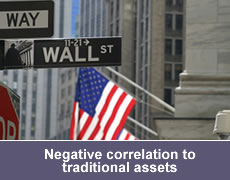Why Managed Futures

Most traditional portfolios are limited to stocks, bonds, and perhaps real estate. Managed futures enable investors to tap into other opportunities – agricultural
products, energy, metals, equities, interest rates, and currencies – via
global futures exchanges. Because of their use of commodity
futures, managed futures managers are sometimes referred to as ‘commodity
trading advisors’ (CTAs).

A significant reason to invest in managed futures is the low or negative correlation with traditional asset classes such as equities and fixed income. Managed futures have performed positively during large equity downturns.

Managed futures can profit from changing economic environments by generating returns in both rising and falling markets. Managed futures programs can take long positions in rising markets and short positions in declining markets. Most conventional investments can only profit when markets rise.

Most
traditional funds are managed for performance against a defined
benchmark, such as a market index. Managed futures follow
an absolute return approach and aim to provide positive returns
to investors in all market situations.
